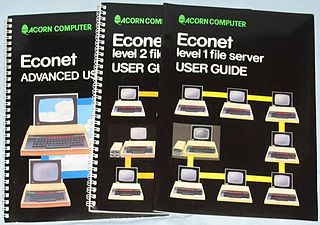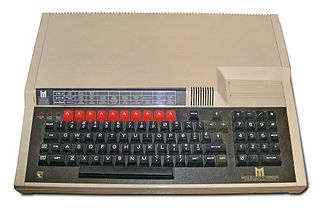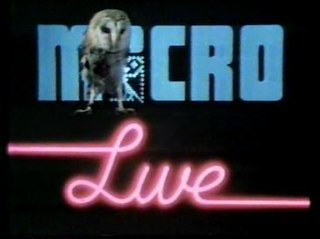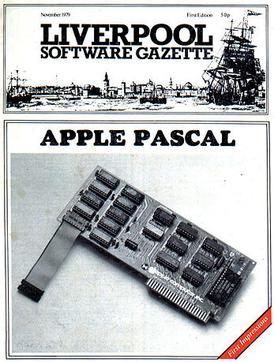Related Research Articles
Microware Systems Corporation was an American software company based in Clive, Iowa, that produced the OS-9 real-time operating system.
BBC BASIC is an interpreted version of the BASIC programming language. It was developed by Acorn Computers Ltd when they were selected by the BBC to supply the computer for their BBC Literacy Project in 1981.

Acorn Computers Ltd. was a British computer company established in Cambridge, England, in 1978. The company produced a number of computers which were especially popular in the UK, including the Acorn Electron and the Acorn Archimedes. Acorn's BBC Micro computer dominated the UK educational computer market during the 1980s.
Tiny BASIC is a family of dialects of the BASIC programming language that can fit into 4 or fewer KBs of memory. Tiny BASIC was designed by Dennis Allison and the People's Computer Company (PCC) in response to the open letter published by Bill Gates complaining about users pirating Altair BASIC, which sold for $150. Tiny BASIC was intended to be a completely free version of BASIC that would run on the same early microcomputers.

The Kansas City standard (KCS), or Byte standard, is a data storage protocol for standard cassette tapes at 300 bits per second. It originated in a symposium sponsored by Byte magazine in November 1975 in Kansas City, Missouri to develop a standard for the storage of digital microcomputer data on inexpensive consumer quality cassettes. The first systems based on the standard appeared in 1976.

Southwest Technical Products Corporation, or SWTPC, was an American producer of electronic kits, and later complete computer systems. It was incorporated in 1967 in San Antonio, Texas, succeeding the Daniel E. Meyer Company. In 1990, SWTPC became Point Systems, before ceasing a few years later.
Acornsoft was the software arm of Acorn Computers, and a major publisher of software for the BBC Micro and Acorn Electron. As well as games, it also produced a large number of educational titles, extra computer languages and business and utility packages – these included word processor VIEW and the spreadsheet ViewSheet supplied on ROM and cartridge for the BBC Micro/Acorn Electron and included as standard in the BBC Master and Acorn Business Computer.

The BBC Domesday Project was a partnership between Acorn Computers, Philips, Logica, and the BBC to mark the 900th anniversary of the original Domesday Book, an 11th-century census of England. It has been cited as an example of digital obsolescence on account of the physical medium used for data storage.

Econet was Acorn Computers's low-cost local area network system, intended for use by schools and small businesses. It was widely used in those areas, and was supported by a large number of different computer and server systems produced both by Acorn and by other companies.

The BBC Master is a home computer released by Acorn Computers in early 1986. It was designed and built for the British Broadcasting Corporation (BBC) and was the successor to the BBC Micro Model B. The Master 128 remained in production until 1993.
The Disc Filing System (DFS) is a computer file system developed by Acorn Computers, initially as an add-on to the Eurocard-based Acorn System 2.

The Machine Operating System (MOS) or OS is a discontinued computer operating system (OS) used in Acorn Computers' BBC computer range. It included support for four-channel sound, graphics, file system abstraction, and digital and analogue input/output (I/O) including a daisy-chained expansion bus. The system was single-tasking, monolithic and non-reentrant.

Making the Most of the Micro is a TV series broadcast in 1983 as part of the BBC's Computer Literacy Project. It followed the earlier series The Computer Programme. Unlike its predecessor, Making the Most of the Micro delved somewhat deeper into the technicalities and uses that microcomputers could be put to, once again mainly using the BBC Micro in the studio for demonstration purposes. The series was followed by Micro Live.

Micro Live is a BBC2 TV series that was produced by David Allen as part of the BBC's Computer Literacy Project, and followed on from earlier series such as The Computer Programme, Computers in Control, and Making the Most of the Micro. As the name implies, the series was broadcast live.

A BBC Micro expansion unit, for the BBC Micro is one of a number of peripherals in a box with the same profile and styling as the main computer.

Liverpool Software Gazette was a short-lived computer magazine published by Microdigital Ltd, a company who were based in Liverpool, England and run by Bruce Everiss.
In the BBC Microcomputer System, the Tube is the expansion interface and architecture which allows the BBC Micro to communicate with a second processor, or coprocessor.

The British Broadcasting Corporation Microcomputer System, or BBC Micro, is a series of microcomputer designed and built by Acorn Computers Limited in the 1980s for the Computer Literacy Project of the BBC. Designed with an emphasis on education, it was notable for its ruggedness, expandability, and the quality of its operating system. The machine was the focus of a number of educational BBC TV programmes on computer literacy, starting with The Computer Programme in 1982, followed by Making the Most of the Micro, Computers in Control in 1983, and finally Micro Live in 1985.
Smoke Signal Broadcasting, Inc. (SSB), later known as Smoke Signal, was an American computer company founded in 1976 by Frederic Jerome "Ric" Hammond of Hollywood, California. The company earned its reputation by offering expansions for the Southwest Technical Products (SWTPC) 6800 microcomputer. It later manufactured its own line of computers, called the Chieftain. Though it remains little-known, Smoke Signal was an early and important manufacturer of multi-user computer systems.
References
- 1 2 "The legacy of the BBC Micro" (PDF). Nesta.
- ↑ "Advisory Committee of Microelectronics in Education". Parliamentary Debates (Hansard) . 9 June 1981.
- 1 2 "BBC Microcomputer User Guide" (PDF).
- ↑ "Privacy policy". Connection Software. Archived from the original on 7 February 2015.